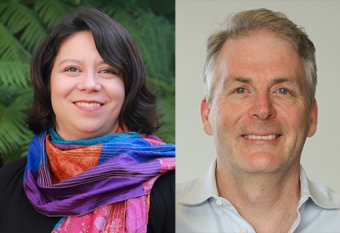
Two UC Santa Barbara engineers are among the 129 new members worldwide elected to the National Academy of Engineering (NAE) for 2021. Materials and chemistry professor Craig Hawker and Rachel Segalman, chair of the Chemical Engineering Department, join the 106 American and 23 foreign engineers honored this year. Election to the NAE is among the highest professional distinctions accorded to an engineer.
Segalman, the Edward Noble Kramer Professor and professor of chemical engineering and materials, was recognized “for contributions to semiconducting block polymers, polymeric ionic liquids, and hybrid thermoelectric materials.”
Hawker, the Alan and Ruth Heeger Chair in Interdisciplinary Science, who also serves as the director of the California NanoSystems Institute (CNSI) and the Dow Materials Institute, was cited ”for contributions to polymer chemistry through synthetic organic chemistry concepts and the advancement of molecular engineering principles.”
“Our campus is thrilled to congratulate Professor Craig Hawker and Professor Rachel Segalman on their election to the world-renowned National Academy of Engineering,” said UC Santa Barbara Chancellor Henry T. Yang, who was elected to the NAE in 1991. “Election to the NAE by one's peers is among the highest professional honors in engineering, and recognizes years of accomplishment having significant impact on health and the quality of life. Both Craig and Rachel have distinguished themselves as pioneers in their fields, and we take tremendous pride in their frontier research contributions."
“The College of Engineering is extremely proud and honored to have two highly distinguished faculty members elected to the National Academy of Engineering,” said Rod Alferness, dean of the UCSB College of Engineering, who was elected to the NAE in 2003. “Professor Segalman and Professor Hawker have made pioneering contributions to the areas of structural control over soft matter and synthetic polymer chemistry, respectively. In addition, they are inspirational leaders in their departments and at the university, and outstanding mentors to colleagues and students. Their scientific discoveries and innovation will drive their fields of engineering and positively impact society for years to come.” read more



